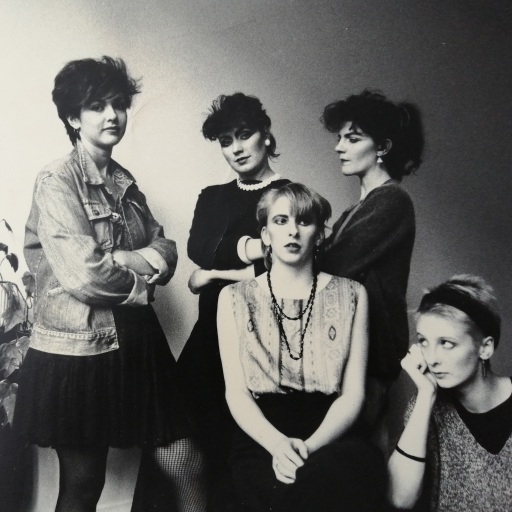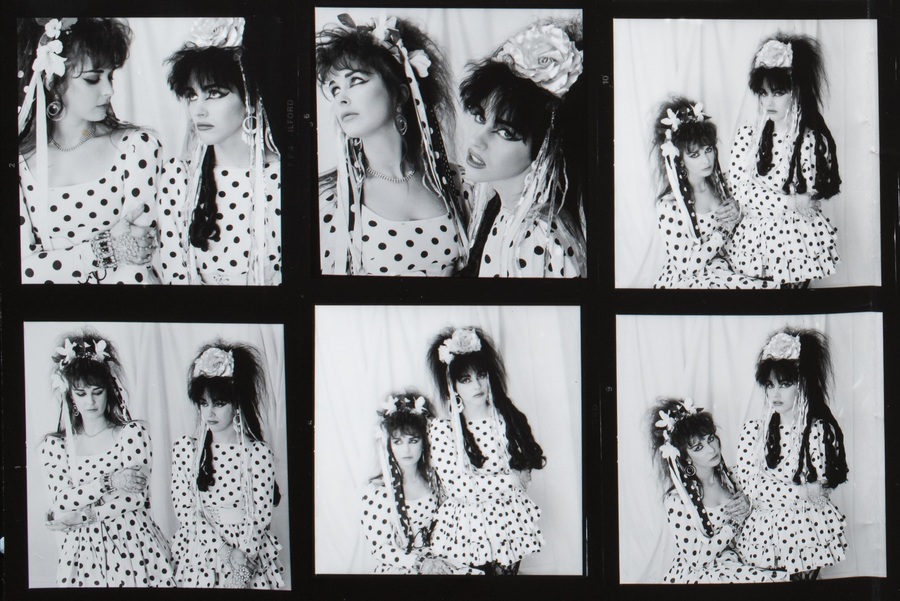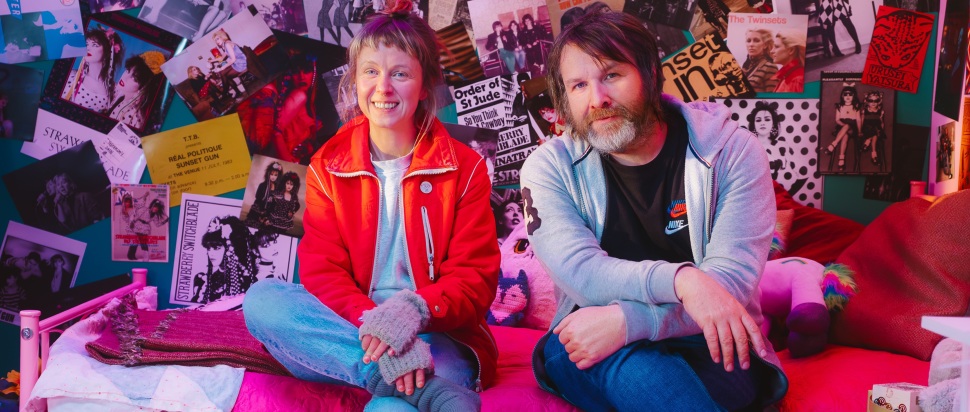Since Yesterday: The Untold Story of Scottish Girl Bands
Ahead of its world premiere at the Edinburgh International Film Festival, we chat to Carla J. Easton to find out more about new documentary Since Yesterday: The Untold Story of Scotland's Girl Bands
“What did you want to be when you grew up? Who did you see that made you think, I could do that too?”
Scottish artist Carla J. Easton says, “For me, that was girls making music together, so in Scotland, where were they?” This question is brought forward in the upcoming documentary Since Yesterday: The Untold Story of Scotland's Girl Bands, made with co-director Blair Young. It’s a question I have asked myself many times; whether looking for them on the walls of King Tut's or at the top of today’s TRNSMT lineup – where are all the women, and more specifically, where are all the girl bands?
This is what Easton and Young have been searching for in the archives for eight years now. Since Yesterday is a celebration of their findings; of the voices who were left out of Scotland’s world-renowned musical canon until now. It’s been a long, slow process for the two, launching a Kickstarter in 2018, pausing through COVID-19 in 2020, sifting through 1,500 artefacts of the archive including Jill Bryson from Strawberry Switchblade’s old white polka dot suitcase full of photographs, and now premiering the documentary at the Edinburgh International Film Festival on 21 August. Easton assures me it’s a journey that has been worth it.
“My first and foremost worry is that the women in the film are happy with it,” Easton explains. “It's their story, their film and each band deserves a documentary in their own right. You just hope that the message of the film, the push for change, is apparent, without ramming it down people's throats.”
And what is the message of the film? “Well, I think for me, we need to redefine what success is,” Easton suggests. “Because the film shows there are successes, and there are successful girl bands. But because you're a woman or non-binary or a Black artist or artist of colour, you can only maybe reach here. Look at The Ettes: they never released a record at all and recorded one demo tape. If we look at their contribution to women making music: that's three teenage girls who got up on stage when sexual assault was common in the audience for any gig, and were like, 'Fuck that.' They saw the guys there and thought, ‘We're going to do that too’, and they wrote songs about how difficult it was being a young girl at that time, just experiencing everyday misogyny. One hundred per cent we should be celebrating that and a hundred per cent that's successful because when the odds were against them, they got up and they did it.”

Sophisticated Boom. Image: Peter McArthur
The documentary does not restrict itself to one genre. We hear from the likes of Sophisticated Boom Boom!, Strawberry Switchblade, The Ettes, The Twinsets, and Lung Leg. While their sounds differ from 60s harmonies to bedroom punk, they are united through their loyalty and experiences of mistreatment and sexual discrimination by the industry. The documentary focuses on “the phenomenon of all-girl bands,” as Easton puts it. Our filmmakers question what it means to be a girl band today, and what it meant then. Easton and Young look at this global issue through a local lens from the 60s right up to the present day.
“It became quite apparent to me that all these women do have success,” adds Easton. "They do have successes; they've got top ten hits, they've supported the Beatles and the Stones, they've played Wembley and had multiple John Peel sessions, magazine covers, and world tours, yet they're not in the general rhetoric of documentaries, films, or exhibitions that celebrate Scottish music.”
It’s emotional hearing from these women today. Easton is right, they have a multitude of successes in their experiences and bravery. It’s a shame that we live in a society that rewards outcome over perseverance. We should reward The Ettes for recording a demo for John Peel with a drum kit made out of cardboard boxes; three teenage girls who got up on stage and wrote songs about how difficult it was being a young girl at that time; The McKinley Sisters supporting The Beatles and The Rolling Stones on tour.
“You know, by interviewing Sophisticated Boom Boom!, you realise that they're the first band to ever play the Barrowlands because they were the support band,” Easton says. “They're the first band that played on the stage, as we know it now, this iconic venue that's recognised throughout Europe, and there's still no mention of them within the building.”

Strawberry Switchblade. Image: Peter McArthur.
Since Yesterday does not look back at history with rose-tinted glasses. Some glasses are crooked and cracked, and some are stuck together again with glittery tape. Seeing strong women, many over 60, talking on screen should not be unusual but it is. These women come united, fearless, and bold, with similar experiences of discrimination and similar barriers that stood in the way of their routes to ‘success’. Much of this came down to not being taken seriously enough or wanting to start a family – it came down to the realities of being a woman. It seemed that one could not be both a mother and a pop star. It seemed that the music industry did and still does not know how to support girl bands. And why not? The most shocking part was that in 2010, The Hedrons were told big labels weren’t willing to take a risk on them in case one of them became pregnant. This is discrimination.
Easton adds; “And it wasn't even that they were fired or dropped for becoming pregnant. It was the fact that the majors weren't signing them because they might. That's in 2010, it's not even that long ago. In any other workplace that would be illegal so why is it still okay in the music industry?”
These are questions you can’t quite believe we are still asking in 2024. Questions that people at the top of the industry tend to ignore and leave up to grassroots organisations to find solutions to. Organisations such as Hen Hoose Collective, Popgirlz and Fanny Riot have built a community for women and non-binary artists to feel heard and supported in their music. “It was a really conscious decision to include the organisations of today because you don't want to make a film that's just a nostalgia trip,” Easton explains. "I don't think that's responsible filmmaking with the recent stats published on women making music. Look at all the people involved in those projects. It's all grassroots and DIY.”
The documentary celebrates the untold stories of Scotland’s pop pioneers but doesn’t hide the fact that there are still major issues today. It’s a push for change and an urge for viewers to reassess their own actions. “I just hope if you watch the film, you're going to look at your own record collection or your own playlists and be like, 'is this diverse?'” Easton adds, “'If I'm buying tickets for events, am I buying tickets for the same sort of people that are always on stage in the same sort of genres?' or 'What can I do at a grassroots level as a consumer of music? Whose voices am I not hearing?' Really sit and ask yourself that because we don't do that.”
Where the music industry praises top charts and money-making names, Since Yesterday asks punters and the music industry to look at perseverance, talent and bravery. We want young people to see themselves in our artists, venues and festivals today. It’s a call to change. Easton adds: “I hope that the perseverance shines through from all the women. I'm not going to sugarcoat the challenges and the perseverance across the decades, and I would hope that the film ends on a note of hope and the possibility of what can be achieved.”
Since Yesterday: The Untold Story of Scotland's Girl Bands gets its world premiere at EIFF, Cameo 1 & 2, Edinburgh, 21 Aug
